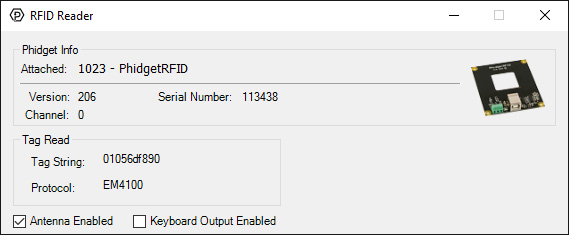Template:UgRFID: Difference between revisions
From Phidgets Support
(Created page with "===RFID=== right|link= When you double click on an RFID object, a window like the one pictured will open. * At the top of the window, informatio...") |
No edit summary |
||
| Line 1: | Line 1: | ||
===RFID=== | ===RFID=== | ||
Double-click on the RFID object in order to run the example: | |||
[[Image:RFID_Example.jpg|center|link=]] | |||
{{UGExampleDescription}} | |||
*Bring a compatible tag close to the 1023 and the tag's string and protocol will be displayed. | |||
*Toggle power to the antenna using the checkbox labelled ''Antenna Enabled''. | |||
* | *Enabling keyboard output will cause your computer to write a string of text whenever a tag is discovered. Park your cursor in an empty text file and try it out! | ||
* | |||
<br clear="all"> | <br clear="all"> | ||
Revision as of 22:46, 13 June 2017
RFID
Double-click on the RFID object in order to run the example:

General information about the selected object will be displayed at the top of the window. You can also experiment with the following functionality:
- Bring a compatible tag close to the 1023 and the tag's string and protocol will be displayed.
- Toggle power to the antenna using the checkbox labelled Antenna Enabled.
- Enabling keyboard output will cause your computer to write a string of text whenever a tag is discovered. Park your cursor in an empty text file and try it out!
